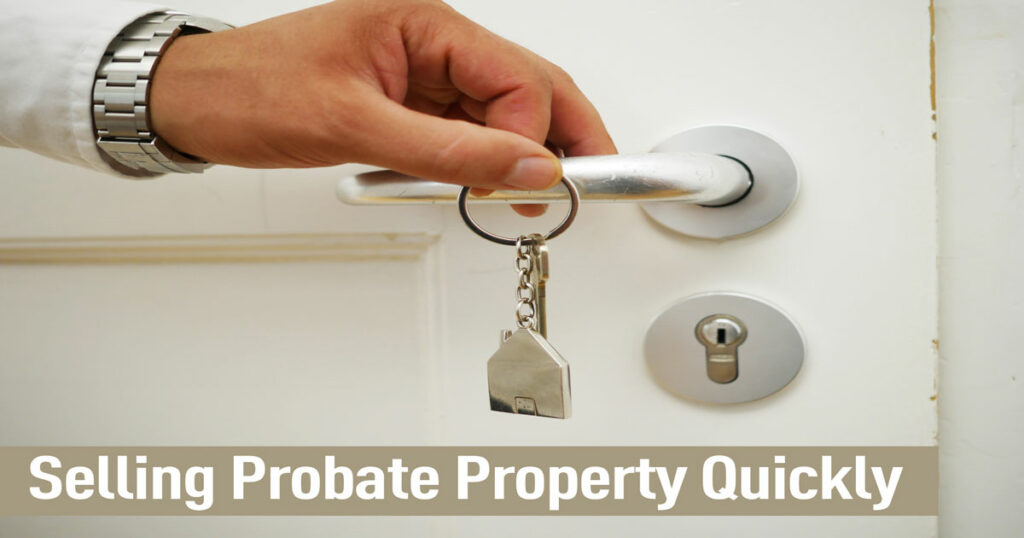What is a Property under Probate?
When a dear one dies, their estate, which includes their own home, other property, money, investments and other assets, must be disposed of by the law and their will, if one exists.
Applying for the lawful right to deal with someone’s estate according to their will is a process called applying for a grant of probate. A grant of probate is an official document sealed by the Probate Registry. It confirms that the will is legally valid and that the person who holds it is legally entitled to settle the estate.
Once a grant of probate is made, the deceased person’s property can be transferred to their beneficiaries or sold.
What are the Problems with Selling a Probate Property?
Selling a probate property involves several potential problems:
- Selling a probate property involves much more bureaucracy than a regular sale.
- Selling a probate property can create a financial problem. You may need to pay out probate fees, Inheritance Tax (if applicable), maintenance costs and other out of pocket expenses yourself before you can obtain probate and then reclaim those costs from the estate.
- Maintaining the probate property before and after probate is granted can be a problem.
How Long does Selling a Probate Property Take?
Selling a probate property can take much longer than a regular sale. According to this report, granting probate can take around 14 weeks. Then the sales and conveyancing process can take several months as with an average house or flat sale.
The UK Care Guide suggests allowing 6-12 months with an average of nine months for probate to complete, with the most complex cases sometimes taking several years.
Can You Sell a House under Probate?
You cannot legally sell a house while it is under probate.
However, you can legally put a house up for sale, market it, conduct viewings, and agree on a sale price with a prospective buyer. You can also conduct other preparatory work before the probate process is completed. So, for example, your prospective buyer can apply for a mortgage in principle and arrange a survey if they wish to. But you cannot exchange contracts and complete them until probate is granted.
If you decide to put the property up for sale before probate is granted, tell prospective buyers, estate agents, and others that the deal cannot be completed until probate has been granted. Some prospective buyers may be willing to wait. However, some buyers may not be able to wait if they need to move quickly or if they are involved in a chain.
How the Probate Process Works
If you are involved with the sale of a probate property it helps to know how the probate process works.
If the deceased person left a will, then the process is known as obtaining a grant of probate.
Whoever is named as an executor in the will can apply for a grant of probate.
If the deceased person did not leave a will, the process is instead known as obtaining a grant of letters of administration, although it is similar to probate. Anyone over 18 can be what is known as the administrator, but it is generally their next of kin if possible.
If the deceased person owned property jointly with others, then ownership automatically passes to them, so probate may not be needed for those assets.
Executors and administrators can apply for probate themselves or pay a probate solicitor to do it on their behalf.
Probate can be applied online or by postal application to a Probate Registry. If applicable, you will need the original will and the original death certificate.
Before probate can be granted, you will need to estimate and report the value of the deceased person’s estate to the Inland Revenue. This includes assessing the market value of their property and finding out the value of any debts they may have had. For more information, see here.
If Inheritance Tax or IHT is due on the estate, you will have to pay some or all of this before probate can be granted. For more information on Inheritance Tax, see here.
Once all the necessary information and supporting documents are obtained, you can apply for a grant of probate.
This information applies to England and Wales. For information on probate in Northern Ireland, see here. A different process known as applying for confirmation applies in Scotland. Here’s more information about dealing with a deceased’s estate in Scotland.
What do You Need to Check?
- Check if the probate property is insured and if the current insurance company can continue the insurance. If the property is not insured, it would be good to arrange suitable insurance. Tell the insurers that the property is empty and awaiting probate as an extra cost may be involved.
- Check to make sure the probate property is secure. Arrange to visit it regularly to ensure everything is OK.
- Check the situation as regards utilities and utility bills. You may decide to have utilities disconnected, or you may choose to keep utilities connected for viewings etc. It may be a good idea to keep the property heated in winter.
- Inform the local authority for Council Tax purposes. If you’re selling a house on behalf of someone who has died, you won’t need to pay Council Tax until after you get probate as long as the property remains empty. After probate is granted, you may be able to get a Council Tax exemption for just six months. If a probate property is left empty long term, some local authorities will charge double Council Tax.
- Check whether you need to carry out any repairs or perhaps redecorate the property before putting it up for sale. This might make it easier to sell and even add to the value of the probate property, or it might make no difference.
- Any expenses incurred can be reclaimed from the estate once probate is granted, assuming there is enough money.
How do I Sell a Property under Probate?
There are several different ways to sell a probate property:
First, you can use an estate agent to market and sell your probate property typically. As with an average house sale, ask for a quotation of their fees first. Don’t forget to tell the estate agent that the property is a probate property so they can tell prospective buyers that there might be a delay in completing the sale.
You can sell your probate property at a property auction. Remember that it is standard practice with property auctions to complete the sale within 28 days. This won’t be possible until probate has been granted. So again, check what the auctioneer’s fees and expenses will be.
There is also a way to successfully sell your probate property without an estate agent or auction. This is to sell the property directly to a cash buyer.
If you sell to a cash buyer, there will be fewer issues that could complicate or delay the sale. The cash buyer should be able to offer you a fixed cash price and completion immediately when probate is granted.
As a result, there’s a good chance that your probate property will be sold, all your out of pocket expenses refunded and the sale money on its way to the beneficiaries of the deceased person’s estate much quicker than by other methods.
📞 Call +447702210159 our friendly team for a same-day offer
Read our top Blogs:
Sell My Property Fast For Cash In Wandsworth
What to Do If Your House Won’t Sell: Fast Solutions That Work
How to Sell House Fast: Proven Tips to Get a Quick Sale Without Estate Agents





